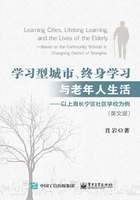
1.4 Definition of Terms
This part offers the definitions and interpretations of the concepts and terminology used in the dissertation.According to the design requirements of the research,the dissertation defines the concepts of lifelong learning city,elderly,elderly learning and elderly lives.The definitions of terms used throughout this dissertation are discussed below.
1.4.1 Learning city
A learning city is a modern city that regards education and learning as the premise of urban construction,urban management,and urban development.The learning city's construction aims to meet the needs of the city's development.It emphasizes promoting educational socialization and social education,encouraging people to learn,and realizing the civil work of learning life,work,and study.
A learning city is not just an old-timer's economic project,but a whole new idea where a new learning system emerges,evolves,and grows to lead economic,social,and political development as a whole.
The learning city is defined as a city that pursues the benefits of study.It is a new mode of city development,and its basic goal is to promote people's all-around development;it advocates learning centralization and citizen centralization,inspiring residents' autonomous learning motivation and supporting universal learning and lifelong learning.
1.4.2 The elderly
Documents of The State Council on the Interim Measures of the Elderly,Sick,Disabled Cadres and The State Council on the Interim Measures of Retired Workers in China stipulated the statutory retirement age of workers in China's nationally owned enterprises,institutions and government organs,and mass organizations.In normal circumstances,males retire at 60 years of age,female workers at 50 years of age,and female cadres at fifty-five years of age.
This study is based on national laws that define old age and who is subject to a mandatory retirement age but has the basic ability to participate in learning activities.
1.4.3 Elderly learning
Because the elderly form a special group of adults,to study the content and characteristics of elderly learning is necessary to understand the definition of adult learning.
In Knowles' opinion,adult learners can transform from being dependent to being independent through learning.Their rich life experience may be their most important learning resources.Their learning plans are closely linked to their social responsibilities.Learning gives people ideas and they apply those ideas knowledge in a timely manner.Adult learning is individual development-oriented and able to meet the needs of different groups.
Han Soonghee pointed out the differences between child learning and adult learning.Firstly,adult learning contains changes according to the different social and political contexts and the diversity of the professional context;non-form study is more meaningful than form study.Secondly,compared with children,adults have more experience,so they pay more attention to the study experience related to growth,changes,and accumulation.Thirdly,overcoming teaching-centricity requires stressing self-dominance and active learning,paying particular attention to learners' abilities to learn on their own.Fourthly,the emergence of life-span developmental tasks helps people understand that it is not only children face developmental tasks;such tasks also occur in adulthood and old age.To accomplish these tasks,people need to keep learning.
Through adult learning,the elderly can make their later life more valuable and meaningful.Learning mainly involves understanding and satisfying the yearning for special knowledge and skills,joining in leisure entertainment,and developing a new feeling for life.
1.4.4 Elderly lives
German philosopher Edmund Husserl put forward “the life-world” that contains all practical truth that comes from cultural significance,which has a profound and solid foundation.This definition greatly enriched the practical significance of our life-world and carried forward the spirit of humanism.The life-world is “a world that is meaningful for life,it is a unity of people and outer things in the process of life;individual was born into it”.
This study defined elderly lives as the total number of activity forms and behavior characteristics designed to satisfy existential needs in certain social conditions for elderly individuals or groups.Therefore,elderly lives mainly relates to the material lives,mental lives,family lives,social lives,occupation,and lives experience after retirement.
Through the combination of concepts that include seniors themselves,aged learning and elderly lives lay the research foundations for this book and provided important norms for researching objects and perspectives.